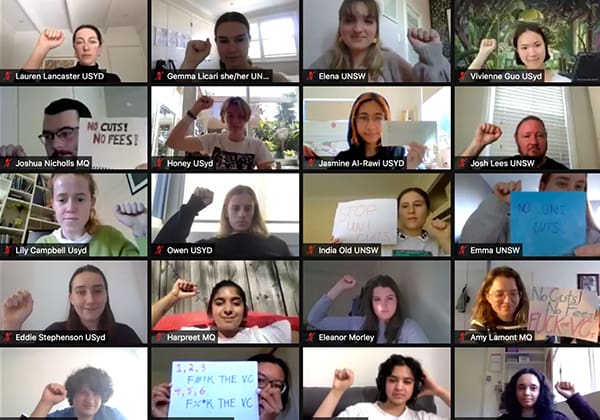Today, around a hundred students gathered online to discuss the future of education activism in Australia. Co-hosted by education action groups from the University of Sydney, UTS, Macquarie, and UNSW, as well as the National Union of Students (NUS), the protest was held simultaneously to the Australian Financial Review’s Higher Education Summit. It opposed government and university attacks on staff jobs and students’ quality of education, which has intensified during the COVID pandemic.
The first speaker, UNSW education activist Rubi Pandolfi, slammed the AFR summit for serving the corporate interests of university management and the Liberal Government.
The summit saw University Vice-Chancellors, Liberal politicians and business leaders discuss the further restructuring of higher education in Australia, following over 17,000 staff redundancies in 2020, and the doubling of student fees in the humanities under the Job Ready Graduates Package. Speakers included the University of Sydney’s Vice-Chancellor Mark Scott and Federal Minister for Education Alan Tudge.
“Universities have enough money to restore staff jobs and courses, yet they are choosing not to in order to boost their profits,” said Pandolfi.The University of Sydney’s ‘cost-saving’ cuts to staff and some departments comes despite the fact it recorded a surplus of $106.6 million in 2020.
“We are demanding free, fully funded education and a reverse to all the cuts and job losses throughout the sector.”
This sentiment was reinforced by Yasmine Johnson, a rank-and-file NTEU member at USyd, who rejected management’s excuses of austerity and financial strife in the pandemic, as they “seize the moment to make the cuts they’ve wanted for years.”
Johnson also highlighted universities’ ties to the private sector, such as the mining and weapons manufacturing industries, which fuel “imperialist violence the world over.” Notably, other speakers referenced Alex Zelinksy, Vice-Chancellor of University of Newcastle and speaker at the AFR’s summit today, who is Australia’s former Chief Defense Scientist within the Department of Defence.
Felix Faber, Education Vice-President of the New South Wales branch of the NUS, spoke in opposition to “brain-numbing” and “costly” compulsory subjects such as OLEs and interdisciplinary units, noting that courses that teach critical thinking skills have been eliminated.
“Students are not passive, and we are not docile, and we hold far brighter aspirations for our futures than sitting still and not causing trouble, with a vision of a society where education has a purpose and work has a meaning beyond the accumulation of profit,” said Faber. This was followed by a ‘radical’ Kahoot game.
Australian historian and journalist Rowan Cahill spoke to the counter-summit, describing the radical landscape of university education and protest in the 1960s. “We challenged and criticised the economic imperative at the heart of university education, and forty years later little has changed,” said Cahill.
“University admin are ruthlessly stripping away remaining vestiges and hints of community and democracy in universities,” added Cahill. “None of this is going to disappear even if we return physically to campus.”
Finally, Chris Hall emphasised the importance of consistent activism to fight the corporatisation of higher education. “These are cuts we haven’t seen in a while, but it’s the cuts we’re going to see continue on,” he said.
As NUS Education Officer and a student at Curtin University in Perth, Hall discussed recent protests by university students in Adelaide and Perth against cuts, including 40 million in immediate resources, staff jobs, and several courses at the University of Western Sydney.
He critiqued Alan Tudge’s purported sympathy for students in this morning’s keynote address at the AFR summit, and the building of hotels at Curtin University and the University of Queensland.
Co-chair Bhattari wrapped up the counter-summit with a video of the Adelaide and Perth protests. The remaining attendees were separated into Zoom breakout rooms to discuss the content of the event and future plans for action.





